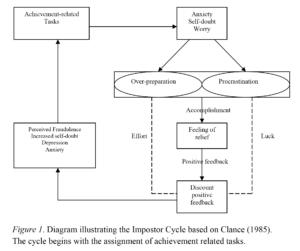
“What am I doing here?”, “Am I really good enough for this job?”, or “I was lucky this time” are thoughts that have probably crossed the minds of most of the readers here at least at some point in their careers. Even though a healthy level of self-doubt is normal for everyone, these thoughts and especially the feeling of being a fraud, can be signs of the so called imposter “syndrome”. It is estimated that at least 70% of people across all disciplines will experience at least an episode of impostorism in their lives (Sadulku & Alexander, 2011). So it comes that even very successful people like former First Lady Michelle Obama, or Facebook COO Sheryl Sandberg already expressed feelings of impostorism despite their world-wide known achievements.
But what is the Imposter Syndrome or better the Imposter Phenomenon?
The imposter phenomenon was first recognized in 1978 by Clance and Imes and is described as a “pervasive psychological experience of a person believing that they are a self-perceived intellectual fraud and fearing they might be recognized as an imposter” (Sadulku & Alexander, 2011). Even though the term imposter “syndrome” is better known, I will continue to refer to the imposter phenomenon since the term “syndrome” is viewed critically due to its medical nature (see Feenstra et al., 2020 for more details). So many high-achievers, who for outside observers appear remarkable successful, might actually sense themselves as a fraud. Harvey and Katz (1985) identified 3 core characteristics of the imposter phenomenon:
(1) the believe that she/he fooled other people,
(2) the fear of being exposed as an impostor, and
(3) the inability to attribute own achievements to internal qualities such as ability, intelligence or skills.
Many recent studies showed that the imposter phenomenon is not limited to a certain type of occupation or social group but rather is observed across all genders, different occupations and career stage levels and is found across different cultures (Kets de Vries, 2005; Sadulku & Alexander, 2011, Vaughn et al., 2020). However, it is also proven that women and members of marginalized groups experience higher levels of impostorism as a result of the prevailing stereotypes and resulting discrimination (Bravata et al., 2020; Vaughn et al., 2020).
Suffering from imposter feelings can have strong negative effects on the well-being and career advancement. Affected individuals often fear that success could have negative consequences for them, inducing self-manipulative behaviors such as the severe underestimation of their own strengths, which might cause the denial of unique advancing opportunities. This, among many other factors, can cause psychological distress, such as depressions and anxiety, to which impostors often react with extreme over-preparation (Kets de Vries, 2005; Sadulku & Alexander, 2011; Feenstra et al., 2020).
Internal and external contributors
Reports have shown that internal factors, such as personality traits, as well as external factors, such as social and environmental aspects, can play an important role in the manifestation of imposter experiences (Chapman & Kennette, 2021). Perfectionism, for example, is a commonly shared character trait of people suffering from impostorism. However, recent studies emphasize to critically consider the role of the (social) environment in triggering imposter feelings (Feenstra et al., 2020). They argue that the imposter phenomenon is also context dependent and should be evaluated from different perspectives. For example, on a societal level, persistent negative stereotyping of marginalized groups next to the enormous pressure on people to stifle their own selves, can evoke strong feelings of self-doubt. On an institutional level, underrepresentation in our most commonly strongly hierarchical structured systems can compromise a feeling of belonging and on an interpersonal level, everyday interactions (i.e. being asked for advice or being included in work related discussions) can affect our self-esteem. These studies demonstrate the complexity of the imposter phenomenon and highlight that it is
not merely a dysfunctional “syndrome” that resides within certain individuals, but instead […] a psychological response to a dysfunctional context (Feenstra et al., 2020).
But what can we do about it?
As explained above, the underlying causes of imposter feelings are not solely restricted to an individual’s personality but are also influenced by external factors. Hence overcoming those feelings also has to come from both sides. External contributors have to be addressed by their contextual roots, meaning that we have to tackle the countless stereotypes still prevailing in our society, have to increase diversity across all disciplines and career stage levels of our hierarchical systems and have to assure equal treatment of all individuals. However, combating these external factors is hard and takes time, and in many cases simply lies out of our control, for which reason I will now focus on solutions for internal contributors (if you want to read more on solutions for external contributors you can do so here).
Managing negative emotions by addressing the cognitive distortions imposters hold are regarded as one of the most effective ways to combat imposter feelings. For example, you can try to reframe your situation more logically by looking at your situation and performance more objectively (i.e. look at evaluations of your teaching, reports from your supervisor, etc). Another approach is to share your emotions and experiences. This might help you to gain an external perspective and to learn from people who experienced similar feelings how they overcame these. Also helping someone to get through an imposter phase can help you to train yourself a less distorted way of thinking. When you have to complete new tasks, try to focus on progress rather than perfection and foster a growth-oriented mindset. For example, you can use constructive criticism as a stepping stone for improvement rather than taking it personally and overthink your performance. Another exercise could be to note down positive comments and feedback you receive and your reaction to it. This can remind you of your success, when a new imposter phase might be approaching. And last but not least, celebrate your success and be mindful of it. In science failure is inevitable, whether it is for an experiment or a publication, everyone experiences it and we have to learn that no one was born as a perfect researcher.
References and further reading: Abdelaal, G. (2020). Coping with imposter syndrome in academia and research. The Biochemist, 42(3), 62-64. Bravata, D. M., Watts, S. A., Keefer, A. L., Madhusudhan, D. K., Taylor, K. T., Clark, D. M., Nelson, R. S., Cokley, K. O., & Hagg, H. K. (2020a). Prevalence, predictors, and treatment of imposter syndrome: A systematic review. Journal of General Internal Medicine, 35(4), 1252-1275. https://dx.doi.org/10.1007%2Fs11606-019-05364-1 Chapman, M., Kennette, L. N., (2021, November 21). Combating Imposter Syndrome in Academia [Blog Post]. Retrieved from https://www.facultyfocus.com/articles/philosophy-of-teaching/combating-imposter-syndrome-in-academia/ Clance, P. R., & Imes, S. A. (1978). The imposter phenomenon in high achieving women: Dynamics and therapeutic intervention. Psychotherapy: Theory, Research & Practice, 15(3), 241–247. https://doi.org/10.1037/h0086006 Feenstra, S., Begeny, C. T., Ryan, M. K., Rink, F. A., Stoker, J. I., & Jordan, J. (2020), Contextualizing the imposter “syndrome”. Frontiers in Psychology, 11, 575024. https://dx.doi.org/10.3389%2Ffpsyg.2020.575024 Harvey, J. C., & Katz, C. (1985). If I'm so successful, why do I feel like a fake? New York: Random House. Kets de Vries, M. (2005). The dangers of feeling like a fake. Harvard Business Review, 83(9), 110-116 Sadulku, J., & Alexander, J. (2011). The imposter phenomenon. International Journal of Behavioral Science, 6(1), 75-97. https://doi.org/10.14456/ijbs.2011.6 Vaughn, A. R., Taasoobshirazi, G., & Johnson, M. L. (2020). Impostor phenomenon and motivation: Women in higher education. Studies in Higher Education, 45(4), 780-795.







Pingback: GeoLog | A helping hand: what career support does EGU offer?